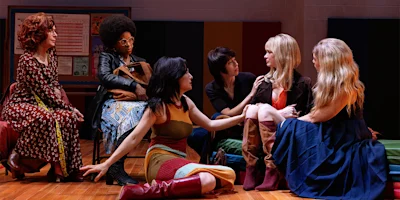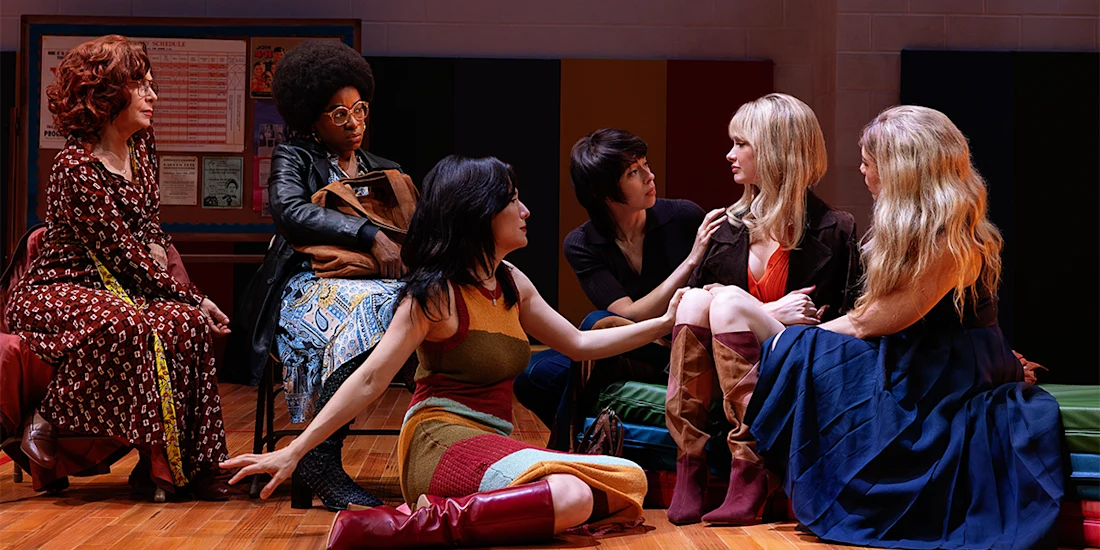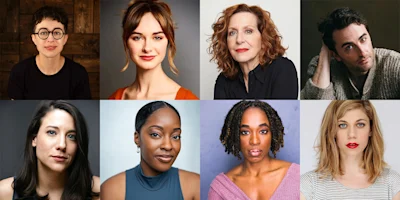
The women of 'Liberation' are changing Broadway, on and off stage
Five women from various departments — writing, directing, acting, design, and producing — discuss their unique collaboration and how it mirrors the play's own story.
Summary
- Five women involved with the Broadway play Liberation discuss their collaboration on the show and working with a majority-female team
- The interviewees include playwright Bess Wohl; director Whitney White; costume designer Qween Jean; actor Kayla Davion; and producer Eva Price
- The play follows a feminist group that forms in suburban Ohio in the 1970s
In 1970, in a rec center basement in suburban Ohio, a group of women from different backgrounds formed a consciousness-raising (CR) group to advance feminism in their little corner of the world. In 2025, in the basement of the Harold and Miriam Steinberg Center for Theatre off Broadway, Bess Wohl's play Liberation told this fictional but history-inspired story, making instant waves with critical acclaim, multiple award wins, and now, a swift Broadway transfer to the James Earl Jones Theatre, where it runs through February 1.
"This is a great American work for the history books," said director Whitney White. "We're all going to be proud when we're older looking back, knowing we were there."
Part of what makes Liberation so impactful is its centering of women's stories on stage and off. The Broadway production has an unprecedented majority of women behind it: Out of the 28 total people credited with writing, directing, acting, design/creative, lead producing, casting, and production stage management, only four are men.
Most of this team carried over from Liberation's Off-Broadway premiere, but the show owes its continued success to much more than their gender identities. The group represents a diverse array of races, ages, and lived experiences, and this production, the women who spoke with New York Theatre Guide agreed, succeeds because they asked for each others' perspectives and let them shape their own work.
"It is a show based off conversation," said White of Liberation. In that spirit, New York Theatre Guide sat down with women from five of the play's departments — playwright Wohl, director White, costume designer Qween Jean, actor Kayla Davion, and producer Eva Price — to talk about how, much like the CR group on stage, they came together to mold their diverse experiences into the production. These are edited excerpts from that conversation.

How do the conversations in Liberation parallel the ones you're having among each other?
Bess Wohl (playwright): The whole process of making this play has been a huge consciousness raising for me. I grew up with a mom who worked at [the feminist magazine] Ms., so I thought I was pretty aware. Yet, making this play, I've had moments of awakening, from showing early drafts of the script to people and having them say things to me like, "Well, this will never get produced. It has seven women in it. It has nudity in it."
Whitney White (director): A lot of us are struggling with discrimination in our jobs, in our homes, where our kids go to school. We found liberation in talking about these things.
What's dangerous about the show is that it's women in conversation, and not just any kind of women. It's an intersectional group of women, and the thing they are afraid of, whoever that "they" is for you, is lateral political conversation among groups.
[Likewise,] nobody wants us all to have one dialogue. We're all so siloed, and the show is a portrait of how one dialogue can get a show on Broadway.
Eva Price (producer): Amen to all of that. So often we, as women producers, are operating on a singular level. We are often the only female producer in the room.
There's a free and safe space of conversation and conflict that you don't always have when you're not in a group of women. That has been inspiring and encouraging, not only for this moment, but for what I see as the future of producing.
Women have always been more successful when they come together and work as a group, and this is an example of that in its truest form. We have a cross-section of women in our marketing department, in our press department, in our design department, in our crew, in our general management.

Did you deliberately set out to have a mostly female team?
White: I'm kind of proud of this: My first thought was actually just, "Who's going to slay this play?" Who's going to care about it? Who has the expertise? Who has the aesthetic excellence, experience, and vision? And after sitting with myself and my rolodex, and who's working in the American theatre, these are the names that were at the top: [lighting designer] Cha See, Qween Jean, [sound designer] Palmer Hefferan. And, of course, [set designer] David "Daddy" Zinn. We love him. Honorary femme forever.
Those are the avengers for this play. And yes, they happen to be women, but what even precedes their gender identity and self-expression of that gender is that they can play, and they were the right voices for this play.

What outside experiences are you bringing to your work on this play? Qween, for one, you're an activist, having founded the Black Trans Liberation movement.
Qween Jean (costume designer): I, for a long time, used to think I had to separate my role as a human rights advocate and as a storyteller. And ultimately it became very clear to me — like, day two in the field — that there is no separation.
In this design world and also as a storyteller, you have to ensure people are taken care of, people are being heard. So you have to advocate. That happens in the story, and it also happens in real life. There are a lot of compounding situations that are affecting people in this very moment as it refers to immigration, human rights, trans rights.
These women [in the play] are engaging in really deep and severe conversation that sometimes doesn't agree with them or doesn't speak to their experience. How do we actually share with respect? We understand that this is your experience, that this is mine, but we ultimately know that we have to be unified in this moment and learn from each other.
White: Sometimes the way scholarship and critique around shows by, and made by, and produced by women [is], you'll read an article about unnamed male playwright, male producer, male team, and everyone talks about their brilliance, their aesthetic, their approach to the work, where the work came from [...] and then when female actors, producers, writers, directors sit down, the conversation is so different.
I'm bringing in this intellectual desire for the world to know how fiercely people are working on the show, and with what rigor. I'm a school mom; I'm bringing that into the work a little bit right now.
Jean: As an artist, it is my duty to fight for freedom, but it's also my duty to reflect the times. And in the 1970s, there is undeniable strength in the way that women not only cultivated, but were sustaining each other through, the oppressive order.
You can make change within your household, within your school, within your institution, within your house of worship. You can make change in your relationships. We are hoping people will leave this theatre [...] with the strength and the audacity to go back and submit questions and to be a rabble-rouser.
If these group of women somewhere in Ohio were meeting in a gym to make change happen for their households, imagine what we could do with all the resources and the power we have together.

You've talked about the external challenges you faced while working on this play. What internal challenges did you have to work out in rehearsals, and how did you do it?
Kayla Davion (actor): The emotions that come up for you are heavy. They get you agitated, as Qween said. They get you wanting to make movement.
We're not against anyone; it's just about the validation of conversation and what that brings to a table. So for me, the internal battle was about vulnerability. It was about being confident enough to speak up and to have these conversations.
Wohl: It became clear that there was the consciousness-raising group in the play, and then there was this larger consciousness-raising group that we were making in the room.
I could turn to Qween Jean and ask her a dramaturgical question; I could turn to Whitney and ask her a question that [...] would normally be a writing question. We all were beautifully able to reach beyond our prescribed lane and make it together.
That sense of being able to foster a conversation where everyone's respected and has dignity [...] that also is something I'm trying to represent in the play. That doesn't mean there's never conflict, but ultimately, you make something so much more beautiful and something that has so much more integrity. Artistically, I've never experienced that before in a room.

What is something that somebody from another department opened up for you?
White: I tried a different approach to [directing this play]. Sometimes we directors will want to go in the process, and you want to control everything. But I wanted to see, if this was a documentary-based project and I charged everyone to do their part of the research as well, could my research be in dialogue with what the actors were naturally drawn to?
Kayla plays a very interesting character. Many people make assumptions about where Black women's politics lie [...] and Beth has written this deliciously surprising character who challenges the integrity of neoliberalism. And it's thrilling, and Kayla's approach to it really reminded me to [...] keep open to what the actor is bringing to it. There was my idea of the character, and then Kayla found something totally her own.
Davion: Bess does a really beautiful job at writing for all women. What it opened up for me — Bess specifically — was the perspective of Black women [...] I had to go back and do my own research.
They had these clips on YouTube [of] the Black Journal program [...] and they had so many different opinions about the Black value system for Black women. I didn't realize how important it was to have that perspective. To be honest, I just saw everybody as Pam Grier.
Jean: Being able to watch Whitney White lead this company is a profound gift. She continues to not only break barriers, but she revitalizes and reinvigorates the way that everyone shows up.
What's even greater is the community that's being cultivated. There is care and reciprocity outside of the work, and there's a true mindfulness about our families. Whitney leads with love and compels and invites everyone to bring their best selves.
Wohl: Because this play is so intersectional and so intergenerational, there would be no way for me to create it without this collaboration. Everyone in the room brought me something in terms of our beautiful company of actors. Being able to talk to [actor] Betsy Aidem about her perspective from another generation — she was a teenager in the '70s; she was telling us what it was like for her to actually live through that experience. That was hugely useful. Having a non-binary member of our company, Adina Verson, brought another perspective.
One of the frustrations as a playwright is you're only one person. You cannot live inside of everyone's perspective, and yet you try, because that's also the project of creating the play, and you just can't do it without the incredible generosity of these collaborators. That's part of why this play exists, is because of all of them.
Price: [The Liberation producers] are four women from distinctively different decades, which means each of our perspectives are distinctively different [...] but there is a shared respect and understanding [...] that is helpful and actually creating better outcomes for our decision-making process. You actually are speaking to a larger audience as well.
Though it's about women at the forefront, there is universality in the specific. People from all walks of life see themselves in the story. That includes men, that includes non-binary and trans folks, that includes people in their 20s and in their teens to [people] in their 70s and 80s.
I think a lot about what gay men had with The Normal Heart and Angels in America and The Boys in the Band, incredibly significant plays for gay men and the history of gay men and the future of gay men. And this play, to me, is finally that, but for women. How unbelievably chilling and goosebump-inducing is it for this group of women to be able to say — to our children, our grandchildren, and the future of theatre — that we were there when Liberation hit Broadway?
Photo credit: Liberation on Broadway. (Photos by Little Fang)
Originally published on






